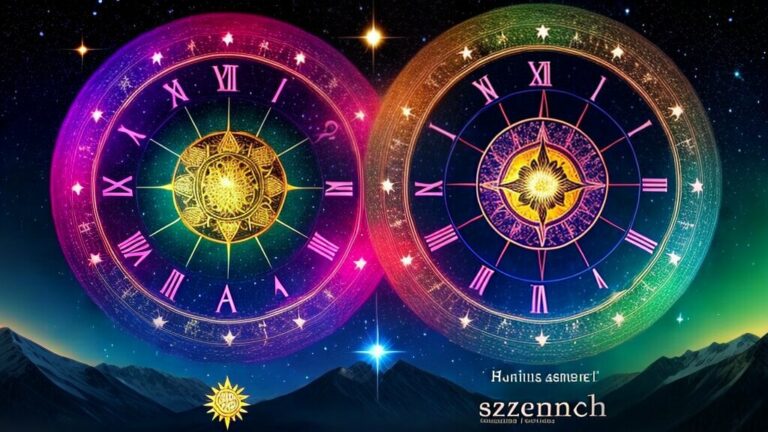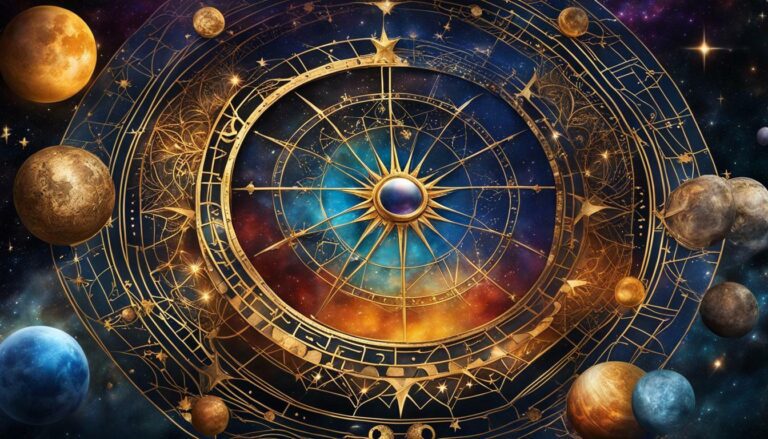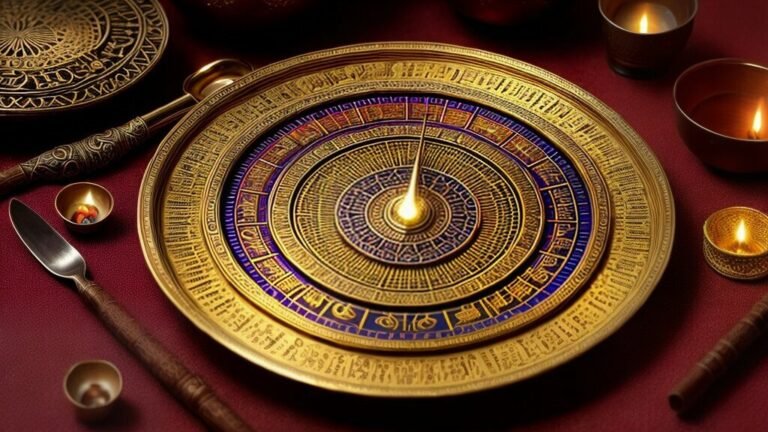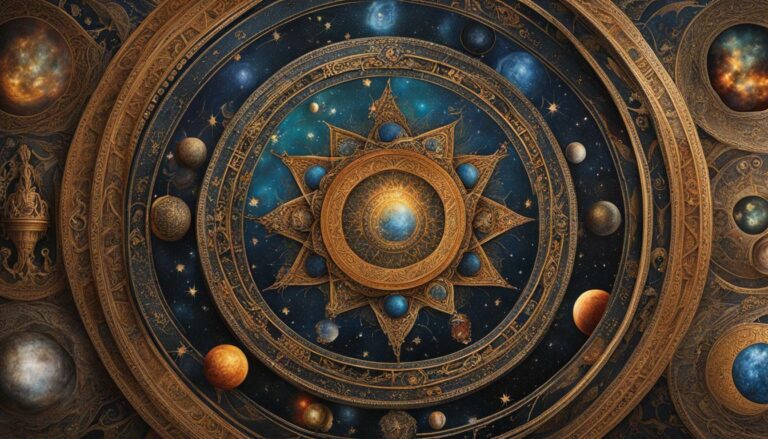Unveiling the Mystery: What is Ceres in Astrology Explained
If you’re interested in astrology, you may have heard of Ceres. Ceres is an asteroid located in the asteroid belt between Mars and Jupiter, named after the Roman goddess of agriculture and motherly love. But what does Ceres mean in astrology and how can it impact your life?
Astrologers have long studied the placement of Ceres in a natal chart to gain insight into an individual’s nurturing tendencies, relationships, and emotional patterns. Ceres is associated with motherhood and nurturing, and can provide valuable information about a person’s ability to care for themselves and others.
Key Takeaways:
- Ceres is an asteroid named after the Roman goddess of agriculture and motherly love.
- Astrologers use the placement of Ceres in a natal chart to gain insight into an individual’s nurturing tendencies, relationships, and emotional patterns.
- Ceres is associated with motherhood and nurturing, and can provide valuable information about a person’s ability to care for themselves and others.
Understanding Ceres: The Planet or Asteroid?
If you’ve been exploring astrology for a while, you may have come across the name “Ceres.” This celestial body has been a topic of debate among astrologers for years: Is it a planet or an asteroid? The answer isn’t as straightforward as you might think.
First, let’s take a closer look at the characteristics of Ceres. It was discovered in 1801 by an Italian astronomer named Giuseppe Piazzi. Initially, it was classified as a planet but was later reclassified as an asteroid in the 1850s. However, in 2006, a new classification was created for objects like Ceres that orbit the sun and are large enough to have an almost round shape. They’re called “dwarf planets.”
So, technically speaking, Ceres is both an asteroid and a dwarf planet. But what does this mean for its role in astrology?
Many astrologers interpret Ceres as a planet due to its impact on a birth chart. Like other planets, Ceres has a specific astrological symbolism and significance. Its placement in a natal chart can reveal valuable insights into an individual’s personality, particularly in terms of nurturing and nurturing tendencies.
On the other hand, some astrologers insist that Ceres should be classified as an asteroid. They believe that asteroids have a more feminine energy and can provide insight into an individual’s relationships and emotional patterns.
Understanding Ceres in Astrology
Regardless of its classification, Ceres has an important role to play in astrology. Its placement in a natal chart can provide valuable insights into an individual’s emotional needs and nurturing tendencies. Astrologers look to which house Ceres is in and its aspects to other celestial bodies to understand this symbolism.
For example, if Ceres is in your 4th house, which is associated with home and family, you may have a strong need to nurture and take care of others. If Ceres is in a difficult aspect with another planet, such as Mars, you may struggle with expressing your nurturing tendencies in a healthy way.
But beyond its placement in a natal chart, Ceres also has a deeper symbolic meaning in astrology. To understand this, we must delve into its mythological origin.
“Ceres was the Roman goddess of agriculture, grain crops, fertility and motherly relationships. Ceres represents the nurturing principle and is frequently associated with the sign of Cancer. In myth, Ceres was devastated by the loss of her daughter, Persephone, and her search for her daughter reflects the mother’s need to nurture and protect their offspring.”
Understanding this symbolism can provide even more insight into the influence of Ceres in your life and relationships.
In conclusion, whether you view Ceres as a planet or an asteroid, its placement in your natal chart and aspects to other celestial bodies can provide valuable insights into your emotional and nurturing tendencies. Its deeper symbolic meaning as a representation of motherhood and nurturing principles only adds to its significance in astrology.
Ceres in Your Natal Chart: What Does it Mean?
Ceres, the dwarf planet, plays an essential role in shaping an individual’s personality and life experiences. Its placement in your natal chart can reveal much about your mother-child relationship, nurturing tendencies, and food preferences. Understanding the symbolism behind Ceres in astrology can help you gain insight into your emotional patterns and life experiences.
The interpretation of Ceres in astrology varies depending on its position in your natal chart’s houses and the aspects it forms with other celestial bodies. For instance, if Ceres falls in the first house, you may be seen as a nurturing and caring individual, who values relationships and is in tune with your emotions. If Ceres is in the seventh house, you may have a strong desire to nurture your partner and seek a harmonious relationship.
The aspects formed by Ceres in your natal chart can provide further clues to your emotional tendencies. For example, if Ceres forms a square aspect with the Moon, it can indicate that you have a difficult relationship with your mother or may struggle with nurturing yourself. If Ceres forms a trine aspect with Venus, it can indicate that you have a talent for creating beautiful and comfortable surroundings.
It’s also essential to consider Ceres’ placement in relation to other celestial bodies, such as the Sun, Moon, and Mercury. These interactions can provide deeper insights into your nurturing tendencies, relationship dynamics, and emotional patterns.
In conclusion, understanding Ceres’ position in your natal chart and the aspects it forms can provide valuable insights into your emotional tendencies, relationship dynamics, and life experiences. By examining Ceres’ astrology interpretation, you can gain a better understanding of your nurturing tendencies and mother-child relationship, which can aid you in personal growth and self-awareness.
The Influence of Ceres Aspects
Understanding the aspects of Ceres is key to gaining a deeper insight into an individual’s emotional patterns, relationships, and nurturing tendencies. Aspects indicate how Ceres interacts with other celestial bodies in a natal chart and highlight the areas of life that may be impacted by the mythology and symbolism of Ceres.
Ceres’ conjunction aspect, in which it is located within a few degrees of another planet, intensifies the influence of Ceres in that area of life. This aspect often signifies strong nurturing instincts and a deep connection to the archetype of the nurturing mother.
An opposition aspect between Ceres and another planet can create tension and conflict in how an individual expresses their nurturing and nurturing needs. This aspect may indicate a struggle between the desire for independence and the need for nurturing and attachment.
Ceres’ trine aspect, in which it forms a 120-degree angle with another planet, can indicate a harmonious and easy expression of nurturing instincts. This aspect often signifies an individual who is able to provide comfort and support to others effortlessly.
On the other hand, a square aspect between Ceres and another planet can indicate challenges and obstacles regarding nurturing instincts and relationships. This aspect may indicate a need to address emotional wounds and work on healing patterns of codependency or self-neglect.
The Influence of Ceres Aspects
When analyzing a natal chart, it’s important to take into account the aspects formed between Ceres and other planets. The specific aspects provide further insight into an individual’s emotional patterns, relationships, and nurturing tendencies.
Ceres’ conjunction aspect intensifies its influence in a specific area of life, while an opposition aspect can create tension and conflict between the individual’s desire for independence and their need for nurturing and attachment. Ceres’ trine aspect signifies a harmonious and effortless expression of nurturing instincts, while a square aspect can indicate challenges and obstacles regarding nurturing instincts and relationships.
Unraveling the Symbolism: Ceres’ Meaning in Astrology
As one of the lesser-known celestial bodies in astrology, Ceres often remains a mystery to those who are not well-versed in the field. However, its symbolism and meaning are vital to understanding its impact on an individual’s life.
Symbolically, Ceres is associated with motherhood, nurturing, and abundance. Its mythological origin as the Roman goddess of agriculture and grain highlights its connection to the earth and growth.
In astrology, Ceres’ placement in a natal chart can provide insight into an individual’s relationship with their mother, as well as their nurturing tendencies and ability to provide emotional support. It can also reflect experiences related to food, home, and family.
Additionally, the aspects between Ceres and other celestial bodies can shed light on an individual’s emotional patterns and relationships. For example, a difficult aspect between Ceres and Venus may suggest issues with giving and receiving love, while a harmonious aspect between Ceres and the Moon may indicate a strong emotional bond with one’s mother.
Overall, understanding the symbolism and meaning of Ceres in astrology can provide valuable insights into an individual’s emotional nature and experiences. Take some time to explore your own natal chart and see where Ceres falls to gain a deeper understanding of its influence in your life.
Wrapping Up Ceres in Astrology
Now that you have learned about the significance of Ceres in astrology and its role in shaping an individual’s personality, it’s time to further explore its influence in your own natal chart. By examining the placement of Ceres and its aspects, you can gain deeper insight into your emotional patterns, relationships, and nurturing tendencies.
Keep in mind that while some astrologers consider Ceres a planet, others classify it as an asteroid. Both interpretations provide valuable information that can enhance your astrological understanding.
Ceres’ mythological origin and symbolism also offer additional layers of meaning to its significance in astrology. Its connection to motherhood, nurturing, and abundance provides insight into the areas of life where you may experience these themes.
Final Thoughts
In conclusion, understanding Ceres in astrology can provide valuable insight into your life experiences and personality. By examining its placement in your natal chart and its aspects, you can gain deeper knowledge of your emotional patterns, relationships, and nurturing tendencies. Its symbolism and mythological origin add further depth to its interpretation.
Take some time to examine Ceres in your own natal chart and see what insights you can gain. Remember, astrology is a tool for self-discovery and growth, and Ceres is just one piece of the puzzle.
FAQ
Q: What is Ceres in astrology?
A: Ceres, also known as the dwarf planet, is a celestial body that holds significance in astrological interpretations. It is often associated with nurturing, motherhood, and abundance.
Q: Is Ceres classified as a planet or an asteroid?
A: The classification of Ceres in astrology has been a topic of debate. Some consider it to be a planet, while others classify it as an asteroid. Its significance and role in astrological interpretations depend on this classification.
Q: What does Ceres in my natal chart mean?
A: The placement of Ceres in your natal chart can provide insights into your personality and life experiences. Its interpretation varies depending on the astrological house and aspects it forms with other planets.
Q: How do Ceres aspects influence astrology?
A: Ceres aspects refer to the angles formed between Ceres and other celestial bodies in a natal chart. These aspects can offer further understanding of your emotional patterns, relationships, and nurturing tendencies.
Q: What is the symbolism and meaning of Ceres in astrology?
A: Ceres in astrology symbolizes nurturing, motherhood, and abundance. It draws from its mythological origin and connects with our deep instincts for nurturing and providing sustenance.





